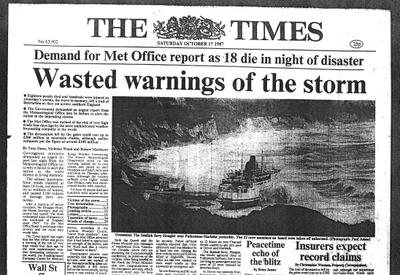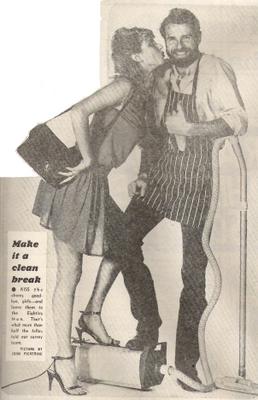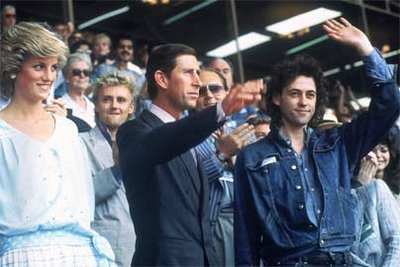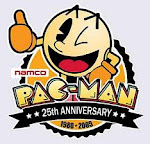 Much is made of Michael Fish's reassurances that all was well on the night of the gale, but apparently he simply reassured viewers, after a telephoned query to the BBC, that there wasn't going to be a hurricane that night. The wind never reached hurricane force, so perhaps we should let him off? Mind you, I can't help thinking that Auntie Beeb and co should have been aware that something was brewing!
Much is made of Michael Fish's reassurances that all was well on the night of the gale, but apparently he simply reassured viewers, after a telephoned query to the BBC, that there wasn't going to be a hurricane that night. The wind never reached hurricane force, so perhaps we should let him off? Mind you, I can't help thinking that Auntie Beeb and co should have been aware that something was brewing!
From The Times, 17/10/1987...
Eighteen people died and hundreds were injured as yesterday's storms, the worst in memory, left a trail of destruction as they cut across southern England.
The Government demanded an urgent report from the Meteorological Office into its failure to alert the nation to the impending storms.
The Met Office was warned of the risk of very high winds four days ago by the most sophisticated weather forecasting computer in the world.
The devastation left by the gales could cost up to £300 million in insurance claims, although earlier estimates put the figure at around £100 million.
Government ministers demanded an urgent report last night from the Meteorological Office in to why it failed to alert the nation to the worst storms in living memory.
The almost hurricane-force winds claimed at least 18 lives, cut electricity to millions of homes, and caused £100 million of damage early yesterday.
After a meeting of senior ministers, Mr Douglas Hurd, the Home Secretary, said the storms had caused "the most widespread night of disaster in the south-east of England since 1945"...
Extract from Peacetime Echo of the Blitz, The Times, 17/10/1987:
When future generations crowd at the knee to ask: "What did you do in the Great Wind, Daddy?" the boldest will answer for sure: "I walked." As London awoke yesterday from a night when even its bravest buildings seemed to be howling, it was to darkness and to stillness.
Then the first humans came into view. They looked footsore but triumphant, coming together in twos and threes to walk together in streets without traffic to destinations in office blocks without lights. "How's your house?" was an invariable greeting, uttered with an almost superstitious awe.
As they walked, they talked with stoic modesty: "Well, I was lucky. Got a lift in a bread van to Kingston. Then the bus came. Never been to the Elephant before, but I thought it would save me a mile or so, I thought 'here goes'. Only took me an hour after that."
They walked looking about them at the bizarre. The pot plants standing on a traffic island. The traffic cone in the window of a sandwich bar. The deckchair atop a bush in St James's Park; the racing skiff from the Serpentine, now embedded in the branches of a tree. A man in the electricity showroom pumping at a gas burner to brew tea...
Whatever next? We didn't have long to wait to find out...
The Yuppie Millionaire's Guide To The Good Life, an article published in The Times on 19th October 1987, featured news of the arrival of a new American magazine simply called Millionaire, which bore the subtitle "Lifestyles of the working rich".
To quote the article:
Even the advertisements appeal to raw indulgence. "Absolute power corrupts absolutely" goes the pitch in the full page [advertisement] for Maserati.
The publisher of "Millionaire" is Mr Douglas Lambert, the Florida millionaire who started "Playgirl". He says he is not aiming at the older, idle variety of rich, but at the younger battalions who have emerged from the business boom of the Reagan years, "the person who is out there earning money and wants to spend it on nice things".
He says: "I have no problem with that. I think the attitudes of the 1960s are gone." A brief excursion in Manhattan is enough to convince anyone that Mr Lambert is understating it. Eavesdrop on any gathering of under-35-year-olds and the topic is almost always related to money.
But the article also recorded the fact that more and more Americans felt the boom era was drawing to a close as the stock market suffered "daily jitters".
Ironically, the 19th October 1987, the very day that the yuppie millionaire's guide to the good life article appeared in The Times, will forever be remembered as "Black Monday"...

1987, which had started out as such a sleek, shoulder-padded, money-worshipping beast, had suddenly gone completely off its rocker...
 From The Times, October 20th 1987.
From The Times, October 20th 1987.
Crowds of dazed young brokers milled around Wall Street yesterday evening trying to come to terms with the unthinkable - the roaring Eighties, the years of easy prosperity, could be over.
As Mr John Phelan, chairman of the Stock Exchange, sat in the ornate boardroom putting a brave face on the day's massacre, tireless young operators stood in the street and agreed: "Maybe this is the big melt-down."
"I've lost my shirt today as well as the money of a lot of other guys," said one stereotype of the Yuppies who swarmed to the financial world to reap the benefits of the Reagan boom.
"We knew this was coming one day," said another, equipped with the red braces and horn-rim glasses that are the badge of office for the generation who came straight from college and have never seen a bear market.
A few streets away, in Harry's Bar, crowds of young brokers swilled their beer from the bottle, their hands trembling from the day's havoc but still cracking nervous jokes. "Maybe we should call it Fall Street," said one, glancing at The New York Post with its banner headline "Wall Street Goes Mad".
"Tomorrow's another day. Perhaps we'll see it go up another three hundred again when it opens tomorrow," one hopeful operator said. Jokes about leaping from windows abounded, but there was a feeling that the country was not in such bad shape as it was in 1929.
Older hands said they saw an end to the collapse provided the market came to its senses within the next few days. They pointed to the continuing strength of the economy, still growing after the longest post-war expansion.
But it was obvious nothing would be the same again after Black Monday. A black man on a bicycle seized the mood when he shouted at the brokers: "Freedom! The Reagan revolution is over. Death to Yuppies."
A tubby broker bellowed back at him: "Whoever dies with the most toys wins. We start over again tomorrow."






























































